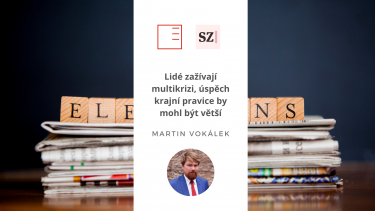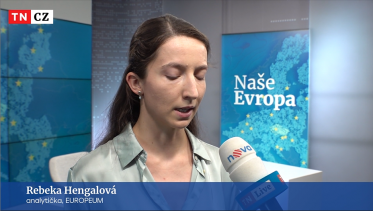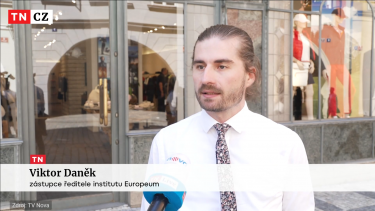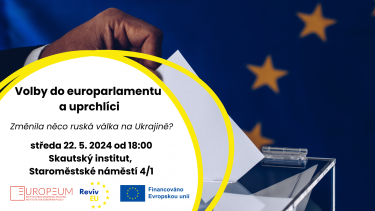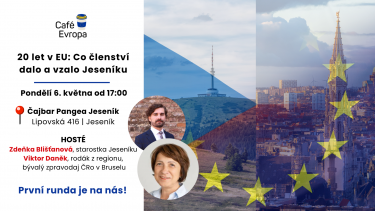RTVS | Elections show Europeans' new priorities
After the European Parliament elections, the two largest factions retained their positions. However, far right parties has made gains at the expense of the Liberals and Greens. It was significant in France, Germany, Austria and other Member States. Why more and more young people vote for them? Will the right-wing groups in the EP join forces? And how can they influence migration policy, support for Ukraine or the Green Deal? For RTVS programme Z prvej ruky comments Žiga Faktor, deputy director and head of the EUROPEUM Institute's Brussels office.
Show more
Seznam Zprávy | People experience multi-crisis, success of the far right could be greater
Despite the rise in support for the far right in most countries, the direction of the EU will not fundamentally change. The People's Party maintains its position as the strongest faction and gains support from centrist parties. The victory of the extreme right in the elections signals the strengthening of conservative and populist parties. However, it is expected that key issues such as the environment and migration will remain on the agenda. The election result does not signify a radical change but serves as a signal to focus on voters favoring conservative and far-right parties. Martin Vokálek, Executive Director of EUROPEUM Institute, commented on the results for Seznam Zprávy.
Show more
TV Nova | How does the Czech public view climate change and the development of renewable energy sources?
Before the upcoming elections to the European Parliament, a debate was held on TV Nova among the leading figures of the seven main political parties, movements, and coalitions. Discussions revolved around important issues such as the migration pact or the conflict in Ukraine. Rebeka Hengalová, a research fellow at EUROPEUM Institute, provided an analysis for TV Nova on how the Czech public views climate change and the development of renewable energy sources.
Show moreTV Nova | External Border Protection
Migration will be one of the main issues in the European Parliament elections. Experts say the newly approved migration pact will not save the European Union, but strengthening controls at the external border of the Schengen area would help. Viktor Daněk, Deputy Director of EUROPEUM Institute, commented on the migration issue for the main evening broadcast on TV Nova.
Show moreRevivEU | Did the Russian war in Ukraine change anything?
We invite you to a public podcast recording focusing on the discussion of changes in the Czech approach to refugees due to the Russian war in Ukraine. We will delve into shifts in Czech solidarity towards refugees and also discuss the new migration pact, its content, and significance.
Show moreCafé Evropa | 20 years in the EU: what has membership given and taken away from Jeseník?
We invite you to the next Café Evropa debate! Green Deal, migration, security, EU elections, EU subsidies... Are you interested in what's in it for Jeseník? Our guests will answer these and other questions. Come and discuss!
Show moreiDnes.cz | What exactly is in the migration pact
The European Union has approved a migration pact, and from 2026 individual states will either accept their share of refugees or pay to opt out of this obligation. However, since the Czech Republic has already accepted a large number of refugees since the outbreak of the war in Ukraine, it should temporarily be exempt from this obligation. However, as noted by Viktor Daněk, deputy director of the Institute for European Policy EUROPEUM, this is not an exemption explicitly granted to Czechia. Exemptions are determined based on the number of people granted asylum or similar protection in a given country.
Show moreCNN Prima News | European migration pact: does the Czech Republic have an exemption or not?
The Chamber of Deputies discussed the EU Migration Pact for over three hours. The opposition criticises the pact and claims that it indirectly introduces quotas. At the same time, there is uncertainty about the interpretation of a possible exemption. What does the pact stipulate and what impact could it have on the Czech Republic? Viktor Daněk, deputy director of the EUROPEUM Institute for European Policy, commented for Partie Plus on CNN Prima News.
Show moreČT24 | The European Parliament approved new migration rules
The package consists of ten legislative proposals. Its support was by no means certain, with the fractions counting every vote. What demands does this comprehensive package place on the Member States? And does the package contain mandatory quotas, as the Czech opposition claims? Viktor Daněk, deputy director of the EUROPEUM Institute for European Policy, commented on the approval process of the new legislative package for ČT24.
Show moreČRo Plus | What will the new EU migration rules commit the Czech Republic to?
After many years of unsuccessful efforts, EU member states and MEPs agreed today on new migration and asylum rules for the European bloc. The series of standards provides for, among other things, more effective checks on migrants and faster return of failed asylum seekers to their countries of origin. It also introduces compulsory solidarity among all EU states, which can help overburdened countries either by accepting part of the migrants or by providing financial or material aid. Our deputy director Viktor Daněk commented on the topic for Radiožurnál.
Show moreStaroměstské náměstí 4/1
Prague 1 - Staré Město
110 00
tel.: +420 212 246 552
email: europeum@europeum.org
https://www.europeum.org

